#spine specialist
Text
🌺Hibiscus Times Daily🌺
Mass problematic diffusion.
EQ in action.
This period’s culmination. Pride.
#active psalms#breaking news#harmonic alignment#c natural#checkerboard chemistry#guide class freestyle for myself#full blast glitter#full flitter#several suimultaneous glimmers through a glimmer#c natural parallel stick#spine specialist#scale play#a mass low vibe pride flip#MLVPF#MCP
7 notes
·
View notes
Text
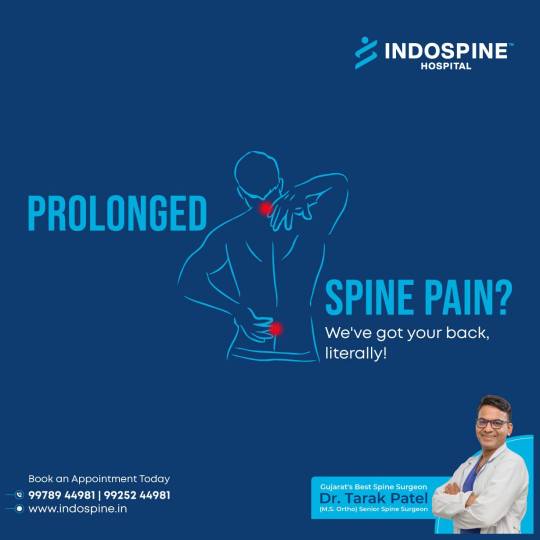
Spinal Cord Treatment in Ahmedabad
Are you dealing with prolonged spine pain? Indospine Hospital has got you covered, with the best spinal cord treatment in Ahmedabad. Our team of spinal cord specialists is dedicated to helping you find relief and restore your spine's health. Say goodbye to discomfort and hello to a pain-free life!
Book your appointment at:
Call: 99789 44981 | 99252 44981
Visit: https://indospine.in/
#Spine Specialist#Spinal Cord Treatment#Lower Back Pain Treatment#IndoSpine Hospital#Best Spine Surgeon
0 notes
Text
Car Accident Doctors near Me -Injury Center
I was in an automobile accident that left me with shoulder, neck, and back pain. I decided to seek out a chiropractor to help alleviate some of the pain and found great reviews of Nashville Accident and Injury online so I decided to give it a shot! After a couple of months of appointments here, my back has never felt better! I feel almost completely back to normal, and I know that I’ll be completely normal by the end of my treatment. The staff is incredibly friendly and welcoming, and I can’t begin to thank them enough for making what could have been an incredibly stressful recovery process feel so routine and comforting. I absolutely would recommend Nashville Accident and Injury to anybody, and I’ll definitely be coming back as long as I live in Nashville!
#Auto Injury#Doctor in Nashville#Car Accident Doctors#Spine Specialist#Accident Physicians#Injury Clinic#Medical Evaluation#Spinal Decompression Therapy#Whiplash Doctors#personal injury attorneys#Injury Attorneys#Nashville
0 notes
Text
Understanding Back Pain Surgery: Is It the Right Choice for You?
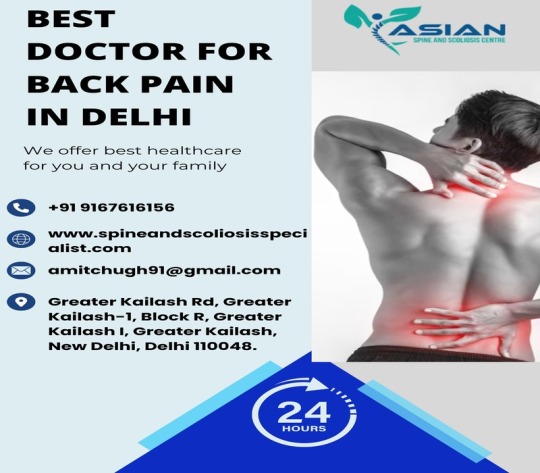
Experiencing chronic back pain can profoundly affect your daily life, leading many to seek various treatment options. One such option is back pain surgery, which might seem daunting at first. In this blog post, we'll explore what back pain surgery entails, identify who might benefit from it, discuss potential risks, and look at what post-surgery care involves.
With insights from renowned Best Spine Doctor In Delhi, Dr. Amit Chugh, we aim to provide a comprehensive guide to help you decide if this is the right treatment for your back pain.
What is Back Pain Surgery?
Back pain surgery involves various surgical procedures that aim to relieve back pain caused by structural abnormalities or damage to the spine. The specific type of surgery recommended can depend on the underlying cause of the pain and the severity of the symptoms. Procedures can range from minimally invasive techniques, which involve smaller incisions and typically quicker recovery times, to more complex surgeries like spinal fusion or disc replacement.
Who Benefits from Back Pain Surgery?
Back pain surgery is not a universal solution for all types of back pain. It is generally considered when other less invasive treatments such as physical therapy, medication, or injections have not provided sufficient relief. Ideal candidates for surgery often include:
Individuals with persistent pain that impairs daily function.
Those with structural spine issues like herniated discs, spinal stenosis, or degenerative disc disease.
Patients who experience nerve pain that results in weakness, numbness, or pain radiating to other parts of the body.
Choosing the Best Doctor for Back Pain in Delhi
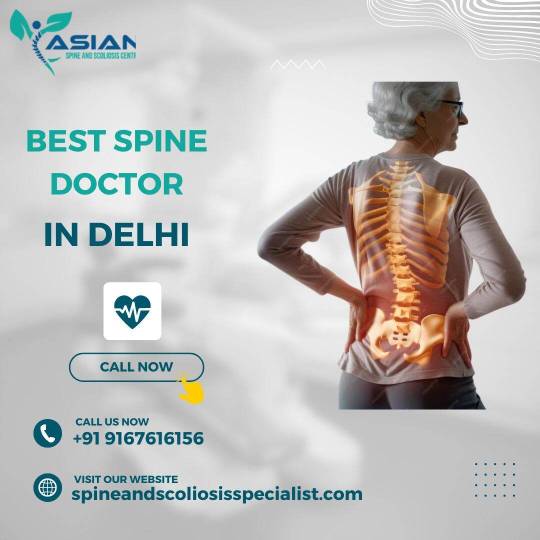
When considering back pain surgery, choosing an experienced and highly skilled surgeon is crucial. Dr. Amit Chugh, recognized as one of the best spine doctors in Delhi, specializes in advanced spine surgery techniques. His expertise and patient-centered approach make him a trusted choice for those seeking relief from chronic back pain.
Potential Risks of Back Pain Surgery
Like any surgery, back pain surgery comes with potential risks. While modern techniques have significantly improved safety, it's important to be aware of possible complications:
Infection: Although rare, there's a risk of infection at the surgery site.
Nerve damage: There's a small chance of accidental nerve damage during the operation, which could result in weakness, pain, or loss of function.
Blood clots: Surgery can increase the risk of blood clots, particularly in the legs or lungs.
Recurring symptoms: There's always a possibility that the surgery might not entirely relieve the pain or that pain might return later.
Post-Surgery Care
The recovery process after back pain surgery varies depending on the type of procedure performed and the individual's overall health. Dr. Amit Chugh emphasizes the importance of following a carefully planned post-surgery care regimen to ensure the best possible outcome:
Physical Therapy: Rehabilitation typically starts with gentle physical therapy to help strengthen the back and improve flexibility.
Medication Management: Pain management immediately after surgery is crucial and may involve medications to help control pain and inflammation.
Lifestyle Adjustments: Patients may need to avoid certain activities and learn new ways of bending, sitting, and lifting to protect the spine.
Reassurance for Potential Patients
If you are considering back pain surgery, know that you are not alone in this journey. With advancements in medical technology and the expertise of specialists like Dr. Amit Chugh, many patients have successfully regained a pain-free life. Discussing all available options, understanding the potential benefits and risks, and choosing a skilled surgeon are essential steps in your path to recovery.
Conclusion
Back pain surgery is a significant decision and should be considered carefully. If you're searching for the Best Doctor For Back Pain In Delhi, Dr. Amit Chugh offers the expertise and compassionate care needed to address complex spine issues. With the right approach and specialist, back pain surgery can potentially offer a new lease on life for those suffering from chronic pain.
#Best Doctor For Back Pain In Delhi#Best Spine Doctor In Delhi#spine specialist#best spine specialist in delhi#best spine surgeon in delhi ncr#spinal cord specialist in delhi#back pain
0 notes
Text
Navigating Back Pain: How a Spine Specialist at Axis Spine Center in Lucknow Can Provide Relief and Improve Quality of Life
Back pain is a prevalent condition that affects millions worldwide, impacting daily activities and diminishing overall quality of life. Fortunately, advancements in medical science have led to specialized care, particularly from spine specialists. In Lucknow, Axis Spine Center stands out as a beacon of hope for those grappling with back pain. This comprehensive guide will delve into the role of a spine specialist in navigating back pain, shedding light on how Axis Spine Center's experts offer relief and improve the lives of their patients.
Understanding Back Pain
Back pain manifests in various forms, from dull aches to sharp, debilitating sensations. Causes can range from muscle strains and ligament sprains to more severe conditions like herniated discs, spinal stenosis, or degenerative disc disease. Lifestyle factors, such as poor posture, obesity, and sedentary habits, often exacerbate these issues.
Role of a Spine Specialist
A spine specialist, also known as a spine surgeon, possesses specialized training and expertise in diagnosing and treating disorders of the spine. At Axis Spine Center in Lucknow, these professionals employ a multidisciplinary approach to address back pain comprehensively. From initial consultation to post-operative care, spine specialists prioritize personalized treatment plans tailored to each patient's unique needs.
Diagnostic Techniques
Accurate diagnosis forms the cornerstone of effective back pain management. Spine specialists utilize advanced diagnostic techniques, including imaging studies like X-rays, MRI scans, and CT scans, to pinpoint the root cause of the pain. Additionally, they conduct thorough physical examinations and may recommend additional tests to gather comprehensive data for informed decision-making.
Treatment Modalities
Once a diagnosis is established, spine specialists at Axis Spine Center employ a range of treatment modalities to alleviate back pain and improve quality of life. Non-surgical interventions such as medication, physical therapy, and injections are often explored as initial options. However, when conservative measures prove ineffective, surgical intervention may be recommended. Axis Spine Center prides itself on employing minimally invasive techniques whenever possible, leading to quicker recovery times and reduced post-operative discomfort.
Patient-Centric Care
At Axis Spine Center, patient well-being is paramount. From the moment a patient walks through the door, they are greeted with compassion and empathy. Spine specialists take the time to listen to patients' concerns, answer their questions, and involve them in the decision-making process every step of the way. This patient-centric approach fosters trust and collaboration, resulting in better treatment outcomes and enhanced satisfaction.
Conclusion
Back pain can be a debilitating condition, but with the guidance of a skilled spine specialist at Axis Spine Center in Lucknow, relief is within reach. By combining expertise, cutting-edge technology, and a commitment to patient care, Axis Spine Center empowers individuals to reclaim their lives and enjoy a future free from the constraints of back pain.
In conclusion, navigating back pain is a journey that requires the expertise of a spine specialist. At Axis Spine Center in Lucknow, individuals can find the support they need to overcome their pain and improve their quality of life. Don't let back pain hold you back any longer—schedule a consultation with Axis Spine Center today and take the first step toward a pain-free future.
1 note
·
View note
Text
Search for a Tampa Bay Neurosurgeon with a Good Reputation, One of the first things to look for when searching for a neurosurgeon is their reputation. You want a doctor who has a good reputation in the community and among their peers. You can also ask friends, family members, or colleagues who have had spine surgery for recommendations.
#Tampa Bay Neurosurgeon#Brandon Neurosurgeon#spine surgery#Neurosurgeon Tampa Florida#Neurosurgeon Near Me#neurosurgeon#spine specialist#spine surgeon
0 notes
Text
Spine Surgery & Minimal Invasive Spine Surgery
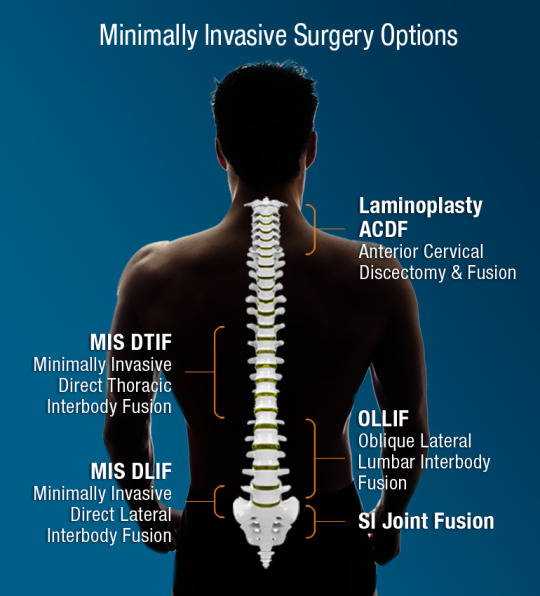
When it comes to spinal health, finding the right specialist is crucial for effective treatment and optimal results. In Nashik, the Axon Brain and Spine Clinic stands out as a beacon of excellence, offering cutting-edge solutions in Spine Surgery and Minimal Invasive Spine Surgery. In this comprehensive guide, we will delve into the intricacies of these procedures, shedding light on what sets the clinic apart as the home to the best spine specialist in Nashik.
Understanding Spine Surgery:
Spine surgery is a medical procedure performed to address various spinal conditions that may be causing pain, discomfort, or restricted mobility. Conditions such as herniated discs, spinal stenosis, and degenerative disc disease may necessitate surgical intervention. At Axon Brain and Spine Clinic, a team of highly skilled surgeons, led by the best spine specialist in Nashik, employs state-of-the-art techniques to ensure the best possible outcomes for patients.
Key Aspects of Spine Surgery:
Evaluation and Diagnosis:
Before recommending surgery, thorough evaluation and accurate diagnosis are paramount. The best spine specialist at Axon Brain and Spine Clinic utilizes advanced diagnostic tools to identify the root cause of spinal issues, allowing for a targeted and personalized approach to treatment.
Surgical Techniques:
Axon Clinic excels in employing the latest surgical techniques to address spinal conditions. Traditional open surgery and Minimal Invasive Spine Surgery are two primary approaches. While open surgery involves larger incisions and more extensive tissue disruption, Minimal Invasive Spine Surgery utilizes smaller incisions, reducing trauma to surrounding tissues and promoting faster recovery.
Understanding Minimal Invasive Spine Surgery:
Minimal Invasive Spine Surgery (MISS) is a revolutionary approach that has gained prominence in recent years. This technique minimizes the disruption of muscles and tissues, resulting in reduced pain, shorter hospital stays, and quicker recovery. The best spine surgeon in Nashik at Axon Clinic is adept at utilizing MISS for a range of spinal conditions.
Advantages of Minimal Invasive Spine Surgery:
Reduced Tissue Damage:
One of the primary benefits of MISS is the minimal disruption to surrounding tissues. This leads to less postoperative pain and a quicker return to normal activities.
Smaller Incisions:
Smaller incisions mean less scarring and a lower risk of infection. Patients appreciate the cosmetic advantages of MISS, as the scars are barely noticeable.
Faster Recovery:
Patients undergoing MISS often experience a faster recovery compared to traditional open surgery. This is particularly crucial for individuals with busy lifestyles who want to resume their normal activities promptly.
Choosing the Best Spine Specialist in Nashik:
Selecting the right spine specialist is paramount for a successful outcome. The best spine specialist at Axon Clinic possesses a combination of expertise, experience, and a patient-centered approach. Here are some key factors to consider:
Credentials and Experience:
Ensure that the specialist is board-certified and has extensive experience in performing spine surgeries. The best spine specialist at Axon Clinic boasts a stellar track record and a wealth of experience in the field.
Patient Reviews:
Reading patient testimonials and reviews provides valuable insights into the quality of care provided. Axon Clinic has a strong reputation for positive patient experiences and successful outcomes.
Personalized Approach:
A patient-centered approach involves tailoring treatment plans to the specific needs of each individual. The best spine specialist in Nashik at Axon Clinic takes the time to understand the unique circumstances of each patient, ensuring a personalized and effective treatment strategy.
Conclusion:
In conclusion, Axon Brain and Spine Clinic stand out as the go-to destination for Spine Surgery and Minimal Invasive Spine Surgery in Nashik. With the best spine specialist leading the way, patients can expect top-notch care, advanced surgical techniques, and a commitment to optimal outcomes. When it comes to spinal health, choosing the right specialist makes all the difference, and Axon Clinic remains the trusted choice for individuals seeking the best spine surgeon in Nashik.
0 notes
Text
The Future of Orthopedics: Advancements in Spine Surgery
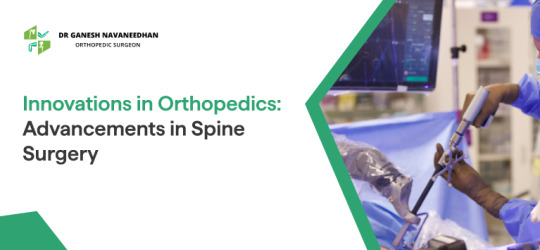
Orthopedics, the branch dealing with musculoskeletal injuries and disorders, is rapidly evolving with innovative technologies and treatments. Spine surgery, in particular, has seen significant advancements in recent years, revolutionizing how we address spine-related conditions. In this article, we'll explore the latest innovations in orthopedics, focusing on the advancements in spine surgery and the potential benefits they offer to patients.
1. Robotics and Artificial Intelligence (AI): The integration of robotics and AI has greatly improved spine surgery procedures. Robotic-assisted spine surgery allows for higher accuracy and precision, resulting in smaller incisions, less tissue damage, reduced postoperative pain, and faster recovery times. Additionally, AI algorithms analyze patient data to aid in treatment decisions and personalized care plans.
2. 3D Printing and Bioprinting: Innovations in 3D printing technology have enabled personalized implants and prosthetics in spine surgery. With bioprinting, living cells can be used to create complex tissues and structures, offering solutions for restoring damaged cartilage and bone. Patient-specific implants provide improved functionality and longer-lasting results.
3. Augmented and Virtual Reality: Augmented and virtual reality technologies assist spine surgeons in precise surgical planning and training. By interacting with 3D models of patients’ anatomy, surgeons can optimize treatment strategies and develop surgical skills. Visualizing the patient's anatomy in 3D aids in identifying optimal pathways for minimal disruption to surrounding tissues, reducing surgical trauma and improving outcomes.
4. Regenerative Medicine and Tissue Engineering: Regenerative medicine utilizes the body's natural healing mechanisms to promote tissue repair and regeneration. Through the use of cells, tissues, and biomaterials, this approach offers a revolutionary way to restore damaged bone and cartilage, reducing the need for traditional joint replacements.
5. Non-Surgical Treatments: Orthopedic medicine offers a range of non-surgical treatments for various musculoskeletal conditions. Physical therapy, injections, and medications provide alternatives for patients who may not require surgery, improving outcomes and reducing healthcare costs and recovery times.
6. Patient-Centered Care: Patient-centered care prioritizes individual needs and preferences, empowering patients to be actively involved in their treatment decisions. This approach, supported by tools like OrthoMind and Physitrack, addresses emotional and social needs alongside physical health, leading to better outcomes and satisfaction.
7. Telemedicine and Remote Monitoring: Telemedicine and wearable technology enable patients to receive care remotely. Remote video consultations and monitoring allow patients to access treatment from home, and wearable devices track progress during rehabilitation, providing continuous support for post-surgical recovery.
Pros and Cons of Incorporating Innovations in Orthopedic Medicine
Ethical and Regulatory Issues: As orthopedic medicine evolves, addressing ethical and regulatory concerns, such as patient privacy, data security, and informed consent, is essential to ensure patient safety and ethical practices.
Cost-Effectiveness and Accessibility: Ensuring the cost-effectiveness and accessibility of innovative treatments remains a challenge, requiring efforts to make them available to all patients, including those from underserved communities.
Interdisciplinary Collaboration and Education: Orthopedic medicine relies on interdisciplinary collaboration between surgeons, physical therapists, and other specialists. Promoting effective communication and cooperation is crucial for delivering comprehensive and holistic care.
Opportunities for Research and Development: The rapid technological advancement in orthopedics presents opportunities for research and development, including customized medicine, regenerative therapies, and 3D printing, to improve patient outcomes.
In conclusion, the future of orthopedic surgical procedures, including spine surgery, is promising. Innovations like robotics, AI, 3D printing, and regenerative medicine are enhancing the accessibility and effectiveness of orthopedic treatments, transforming patient care and outcomes. As patients and healthcare practitioners, staying informed about these innovations and engaging in collaborative discussions will shape the future of orthopedic care and pave the way for more significant advancements.
To know more in detail, visit: https://www.drganeshnavaneedhan.com/blog/innovations-in-orthopedics-advancements-in-spine-surgery/
0 notes
Text
Diagnosis and Treatment of Scoliosis in Ahmedabad
IndoSpine Hospital is one of the most trusted hospitals for scoliosis treatment in Ahmedabad. Our department of spine and scoliosis surgery is equipped with the latest machines for accurate diagnosis and effective treatment. We have a multidisciplinary team of doctors, surgeons and nursing staff who ensure that you receive proper care during and post the course of treatment. Book your appointment today for a consultation.
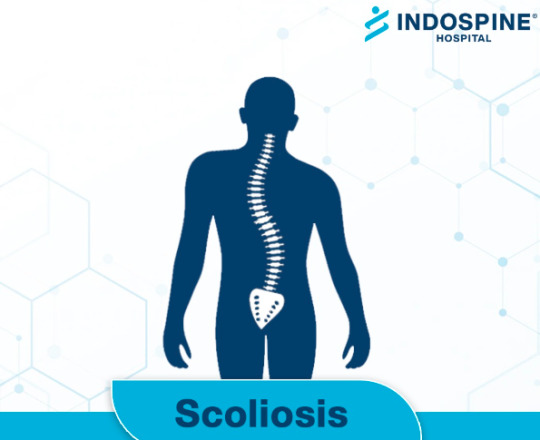
#spine deformity treatment#scoliosis treatment#Spine hospital#Spine doctor in Gujarat#Spine specialist#Lower back pain treatment#indoSpine Treatment
1 note
·
View note
Text
#spine specialist#best spine specialist in delhi#spinal cord specialist in delhi#best spine surgeon in delhi ncr#back pain#back pain treatment
0 notes
Text
Enhancing Well-Being: A Comprehensive Guide to Spinal Diagnostics and Pain Management
Explore the world of spinal diagnostics and pain management to understand the importance of accurate assessments, advanced diagnostic techniques, and effective strategies for alleviating spinal discomfort. This guide provides insights into the key components of spinal diagnostics and the latest advancements in pain management.
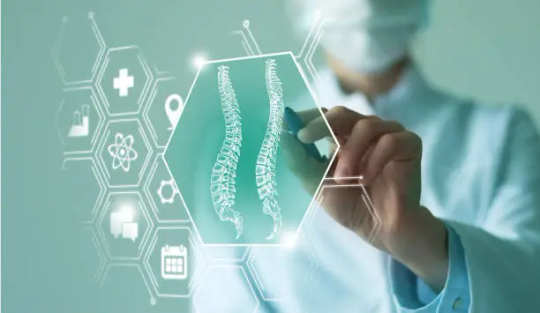
Introduction:
Navigating spinal discomfort requires a thorough understanding of spinal diagnostics and effective pain management strategies. Whether you're seeking relief from chronic back pain or exploring options for spinal health, this comprehensive guide delves into the intricacies of spinal diagnostics and the latest advancements in pain management. Discover the importance of accurate assessments, cutting-edge diagnostic techniques, and personalized approaches to enhance well-being.
Understanding Spinal Diagnostics:
1. Comprehensive Assessment: Accurate spinal diagnostics begin with a comprehensive assessment conducted by healthcare professionals specializing in spine health. This involves a detailed medical history, physical examinations, and a discussion of symptoms to identify potential underlying causes.
2. Imaging Studies: Advanced imaging studies play a crucial role in spinal diagnostics. Techniques such as X-rays, magnetic resonance imaging (MRI), and computed tomography (CT) scans provide detailed insights into the structure of the spine, helping identify issues like herniated discs, spinal stenosis, or abnormalities.
3. Electromyography (EMG) and Nerve Conduction Studies: Electromyography and nerve conduction studies evaluate the electrical activity of muscles and nerves. These tests aid in diagnosing conditions affecting nerve function, such as radiculopathy or peripheral neuropathy.
4. Discography: Discography involves injecting contrast dye into spinal discs to assess their structure and identify sources of pain. This diagnostic procedure is particularly useful in pinpointing issues like disc degeneration or herniation.
5. Bone Scans: Bone scans can reveal abnormalities in bone structure and detect conditions such as fractures, infections, or tumors. They are valuable in assessing the overall health of the spine.
6. Blood Tests: Certain blood tests may be conducted to identify inflammatory markers or indicators of autoimmune conditions that could contribute to spinal discomfort.
7. Collaborative Approach: Spinal diagnostics often involve a collaborative approach, with specialists from various disciplines working together to ensure a comprehensive evaluation. This may include orthopedic surgeons, neurologists, physical therapists, and pain management specialists.
Advancements in Pain Management:
1. Interventional Procedures: Interventional procedures, such as epidural steroid injections, facet joint injections, and nerve blocks, offer targeted relief by delivering medications directly to the affected area, reducing inflammation and alleviating pain.
2. Radiofrequency Ablation (RFA): RFA involves using radiofrequency energy to disrupt nerve function temporarily, providing relief from chronic pain. This technique is commonly used for conditions such as facet joint pain or sacroiliac joint dysfunction.
3. Spinal Cord Stimulation (SCS): SCS involves implanting a device that delivers electrical impulses to the spinal cord, disrupting pain signals and providing relief for chronic pain conditions.
4. Minimally Invasive Surgery: Advancements in minimally invasive surgical techniques offer alternatives to traditional open surgeries. Procedures such as microdiscectomy or endoscopic spine surgery reduce tissue disruption, leading to quicker recovery times and less postoperative pain.
5. Pharmacological Approaches: Medications, including analgesics, anti-inflammatory drugs, and muscle relaxants, play a crucial role in pain management. Advancements in pharmaceuticals continue to provide more targeted and effective options.
6. Regenerative Medicine: Emerging treatments in regenerative medicine, such as platelet-rich plasma (PRP) injections or stem cell therapies, aim to promote tissue healing and regeneration, offering potential long-term relief for certain spinal conditions.
7. Comprehensive Rehabilitation Programs: Integrating physical therapy, exercise, and lifestyle modifications into pain management plans is essential. Comprehensive rehabilitation programs focus on improving mobility, strengthening muscles, and enhancing overall spinal health.
Personalized Approaches for Optimal Results:
1. Tailored Treatment Plans: Every individual's experience with spinal discomfort is unique. Tailored treatment plans, created in collaboration with healthcare providers, consider the specific diagnosis, pain severity, and individual preferences for optimal results.
2. Patient Education: Empowering patients with knowledge about their spinal condition and available treatment options is crucial. Patient education fosters active participation in the decision-making process and promotes better adherence to treatment plans.
3. Holistic Care: Holistic approaches to spinal health encompass not only physical aspects but also address psychological and emotional well-being. Integrating stress management, relaxation techniques, and mental health support enhances overall care.
4. Follow-Up and Monitoring: Regular follow-up appointments allow healthcare providers to monitor progress, adjust treatment plans as needed, and address any emerging concerns. This ongoing collaboration ensures that the chosen interventions are effective.
5. Lifestyle Modifications: Encouraging lifestyle modifications, including maintaining a healthy weight, incorporating regular exercise, and adopting proper ergonomics, supports long-term spinal health and aids in preventing future issues.
For More Info Visit NaPier's Website:
Conclusion:
Navigating spinal discomfort involves a comprehensive approach that begins with accurate spinal diagnostics and extends to cutting-edge pain management strategies. By understanding the intricacies of spinal assessments, exploring advancements in pain relief, and embracing personalized approaches, individuals can embark on a journey toward enhanced well-being. Collaborating with healthcare professionals, staying informed about treatment options, and actively participating in the recovery process contribute to a more holistic and effective approach to spinal health.
0 notes
Text
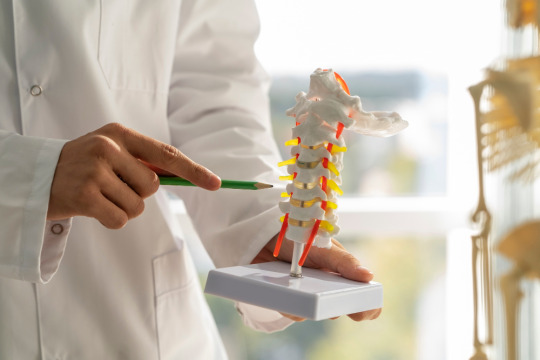
best spine specialist
1 note
·
View note
Text
Spine Care and Health - Konic Healthcare
Are suffering from Spine problems and searching for spine specialists, doctors and neurosurgeons? Visit Konic HealthCare - A Digital Platform - Website : https://www.konichealthcare.com - Phone +91 7696 416 416

The spine, a crucial component of the human skeletal system, plays a vital role in supporting the body's structure and facilitating movement. Unfortunately, various conditions can affect the spine, leading to discomfort and reduced mobility. If you suspect you have a spine problem, seeking medical attention is essential for proper diagnosis and treatment.
Common Spine Problems:
Herniated Discs: When the soft inner material of a disc protrudes through the tough outer layer, it can irritate nearby nerves, causing pain and discomfort.
Spinal Stenosis: This condition involves the narrowing of the spinal canal, putting pressure on the spinal cord and nerves and leading to pain, numbness, or weakness.
Scoliosis: Characterized by an abnormal sideways curvature of the spine, scoliosis can range from mild to severe, impacting posture and causing pain.
Degenerative Disc Disease: Over time, discs between vertebrae can wear down, leading to pain, stiffness, and decreased flexibility.
When to Consult a Doctor:
Persistent Pain: If you experience persistent or worsening back or neck pain, it's crucial to consult a doctor. Chronic pain could be indicative of an underlying issue that needs attention.
Numbness and Weakness: Persistent numbness or weakness in the arms, legs, or other extremities may be a sign of nerve compression, requiring prompt medical evaluation.
Changes in Bowel or Bladder Function: Difficulty controlling bowel or bladder function, particularly in conjunction with back pain, requires immediate medical attention, as it could indicate a serious spinal condition.
Post-Injury Pain: If you experience severe pain following an injury, especially if accompanied by limited mobility, it's advisable to seek medical help promptly.
Remember, early intervention is key in managing spine problems effectively. If you're experiencing persistent or severe symptoms, don't hesitate to consult a healthcare professional for a thorough evaluation and personalized treatment plan.
FAQs
Q1: What are common spine problems?
A1: Spine doctor may keep you aware of common spine problems include herniated discs, spinal stenosis, scoliosis, degenerative disc disease, and various forms of back pain. These conditions can affect different parts of the spine and may lead to discomfort and restricted mobility.
Q2: What are the symptoms of spine problems?
A2: Spine specialist may keep you aware of symptoms based on the specific spine problem, may include back or neck pain, numbness, tingling, weakness, and difficulty moving. Severe cases may lead to issues with coordination and bowel or bladder control.
Q3: When should I see a doctor for spine problems?
A3: If you experience persistent or severe back or neck pain, numbness, or weakness, it's advisable to consult a doctor. Immediate medical attention is needed if you have trouble controlling your bladder or bowels, or if you experience sudden, severe pain after an injury.
Q4: How are spine problems diagnosed?
A4: Under spine specialist doctor or surgeon, diagnosis typically involves a thorough medical history, physical examination, and imaging studies like X-rays, MRI, or CT scans. In some cases, additional tests such as electromyography (EMG) or nerve conduction studies may be required.
Q5: What non-surgical treatments are available for spine problems?
A5: Under best spine specialist doctor or neuro surgeon, non-surgical options may include physical therapy, pain management, medications, lifestyle modifications, and chiropractic care. These approaches aim to alleviate symptoms and improve functionality without resorting to surgery.
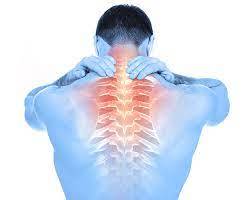
Q6: Can spine problems be treated with medications?
A6: Only specialist doctor may clear all this depending all on your spine conditions, under proper consultation with spine specialist doctors or surgeons, medications, muscle relaxants, pain relievers may be prescribed to manage pain and inflammation associated with spine problems.
Q7: When is surgery recommended for spine problems?
A7: Surgery is considered when conservative treatments fail or when there is a clear structural issue that requires intervention. Spine specialist doctor may advice common surgical procedures include discectomy, spinal fusion, laminectomy, and artificial disc replacement.
Q8: What is the recovery time after spine surgery?
A8: Recovery time varies depending on the type of surgery and individual factors. Spine surgeons may know every phase like pre spine surgery and post spine surgery. Patients may need weeks to months for a full recovery. Physical therapy and rehabilitation are often essential components of the recovery process.
Q9: Can spine problems be prevented?
A9: While not all spine problems can be prevented, maintaining a healthy lifestyle with regular exercise, proper ergonomics, and weight management can reduce the risk. Avoiding smoking and practicing good posture also contribute to spinal health.
Q10: Are there alternative therapies for spine problems?
A10: Yes, alternative therapies such as acupuncture, massage, and certain exercises like yoga or Pilates may complement traditional treatments. It's important to consult with a healthcare professional before starting any alternative therapy.
Always consult with a healthcare professional for personalized advice and treatment options tailored to your specific spine condition. Visit Konic Healthcare
Website : https://www.konichealthcare.com
Phone : +91 7696 416 416
0 notes
Text
See the top spine specialist in Lucknow at Sanjivini Super-Specialty Hospital. The multidisciplinary super-specialty and tertiary care hospital features first-rate medical facilities along with a team of highly skilled and knowledgeable physicians.
0 notes
Text
0 notes